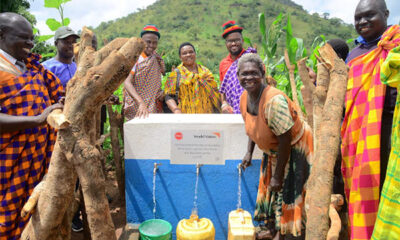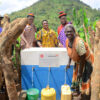Health
More attention needed for success of TB treatment in Mbale

TB cases have increased in the Mbale region.
In spite of Mbale’s improvement in the performance of treatment of tuberculosis from 54th position in 2016, to 23th in 2017, TB cases have increased in the region.
Last week the TB parliamentary caucus led by its chairperson and the Ntwetwe county Mp
Ssebikaali Joel visited Mbale district trying to find means of eradicating the disease out of the country by 2030.
Doctor Jonathan Wangusi the district health officer of Mbale revealed to the legislators that the district receives insufficient funds which cannot fully finance TB treatment.
“We receive only ugx12m quarterly, which money is not enough to repair vehicles, pay utility bills, buy fuel and cater for monthly allowances of health workers” he said,
According to Dr. Wanangusi, Mbale is also under shortage of working equipments for testing, diagnosing and treating TB patients. He revealed that out of 62 TB diagnostic and treatment units in the district, only 30 are doing the activity due to poor laboratory infrastructures in the others.
“The four recently created public facilities also lack microscopes and the whole district has only two gene expert machines yet they have six Multidrug Resistant (MDR) TB patients currently”.
Dr. Pado Busulwa the Technical adviser at Uganda Stop TB pattern ship, defines MDR as the patients whose treatment exceeds the normal six months that a TB patient should get treatment. His/her treatment always takes up to two years. He added that this situation happens when a TB patient fails to complete the first treatment of six months.
Busulwa appended that One gene expert machine costs between USD 17000-USD 18000 and a microscope costs ugx3m each.
The legislators also visited Busiu health center IV one of the hospitals in Mbale that treat TB.
Dr. Maumbe Bernard the director of Busiu Health center IV also explained the same financial problem to the legislators.
He said that they ugx11m which is given to them is not enough to buy drugs and the equipment’s like masks, gloves that are used by the health workers. This puts the lives of health workers at risk.
According to Dr. Maumbe currently, 80 percent of TB patients at the Busiu health center IV are HIV positive including one MDR patient.
The district health officer therefore on this notice asked the TB Parliamentary caucus to advocate for an increase on the budget allocation for the treatment of Tuberculosis in the financial year 2019/20 if the disease is to be eliminated out of the country by 2030 as it is targeted by the government.
Legislator responds
Ssebikaali Joel the Ntwetwe county MP and the chairperson of the TB parliamentary caucus said that their main objective is to make sure that TB is kicked out of the country by 2030. He called upon all the stakeholders to work together so that this can be achieved. ” I call upon the Uganda medical stores, ministry of health, Uganda TB and leprosy and the ministry of finance to work together to ensure that there is no stock out for drugs for TB patients.” He said.
The chairperson made this call after hearing reports from the district health officer who told the caucus that at the end of 2017 and the early 2018, the district suffered a stock out of TB drugs which forced them to run to nearby health centers to borrow.
The Parliamentary TB Caucus was launched on 21st October 2016 with an aim of having Members of Parliament work together to contribute to ending the TB epidemic in the country
Uganda stop TB speaks out

the stop TB campaign
According to Dr. Pado Busulwa the Technical adviser at Uganda Stop TB pattern ship, Although Mbale district improved in the performance of Tuberculosis treatment from 54th position in 2016 to 23 in 2017, there is an increase in the TB cases.
Dr. Busulwa said that all this has been caused by the knowledge gap.”In the communities where TB is contracted, many people don’t have enough knowledge about the disease some think it is witch craft and that is where they die from. “He said.
The Uganda stop TB is anon governmental organization that was launched in 2004 with an objectives of achieving and sustaining the National TB/leprosy Programme case finding and treatment success targets.
What is TB?
Tuberculosis is a bacterial infection that attacks the lungs; acquired through droplets from the coughs or sneezes of an infected person. It is one of the top 10 causes of death worldwide.
He added that access to services is also another problem more so in remote areas where transporting health workers who have the task of educating people about TB are hard.
According to the research that was conducted by World Health Organization (WHO) and Global Fund, in partnership with the Ministry of Health National Tuberculosis and Leprosy Program and several partners in 2017, TB prevalence in Uganda now stands at 253 per 100,000 people compared to 159 per 100,000 people in 2015.
Dr. Busulwa said that one person can affect 15-20 people in a minute. The study further shown that the number of Ugandans living with tuberculosis (TB) has gone up by 60 percent.
Comments


















